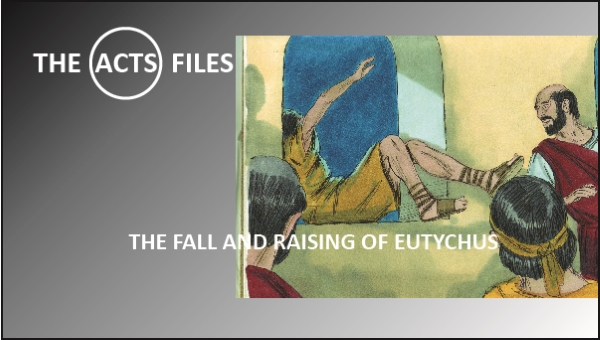By Tyson Thorne

The beginning of Acts 20 reveals Paul’s travel plans. Instead of sailing home, he decided to travel across the province of Asia due to a plot against his life. While this was a new plan to kill Paul, it is uncertain if this is a new threat or the same band of Jews who plotted against him in Acts 9.20. It may be that there was a small band of Jews who had no problem taking the law into their own hands. This is more likely than a band of assassins, who would have easily caught up to Paul in Corinth where he stayed for several years, or even Greece where he taught for several months. While they were certainly committed, they were clearly not well funded or connected.
As these events take place after the Feast of Unleavened Bread we know that it is spring time when Paul begins teaching in Troas. One evening, on what was to be his last night in the city, Paul began teaching and went late into the night. It is hard for the modern reader to imagine attending a service that lasts longer than an hour, much less one that goes past midnight. We give an hour and a half to God each week at church, and at least 20 minutes is praise and worship through music and song. The discipline of the early church is both notable and commendable.
Yet like the modern church attendee, at least one member fell asleep during the service. Because the room was stifling hot the unfortunate napping disciple chose to sit in a window, which he promptly fell from (three stories!) and died. Mimicking the style of Elijah (1 Kings 17.19-.21), Paul threw himself over the boy’s body and raised him to life. Surely the Holy Spirit was doing a remarkable work through Paul that is unprecedented in all of history.
This date is important for another reason, a reason important to Christians throughout the centuries. In verse seven we have the very first ever reference to Christians meeting together on Sunday. While this may have been a common event in the church up to this point, it has never been clearly stated that they met on “the first day of the week”. For those who consider themselves to be “seventh day” believers, Paul certainly had no problem with holding a service on a Sunday.
Many believers have pointed to the resurrection of Jesus being on a Sunday as the reason for our transition from Saturday worship with Jews to Sunday worship. Perhaps we ought to point to the raising of Eutychus instead as evidence that God approved of Sunday worship.
The meeting carried on, with greater vigor and wakefulness one would imagine, until dawn. They broke bread and ate together just before Paul set off for Miletus, and the other believers made sure to get Eutychus home safely -- much to the comfort of all.
|
|
|
